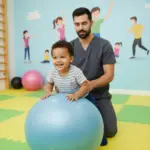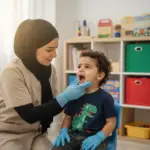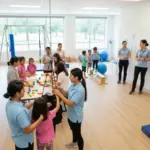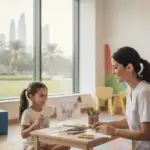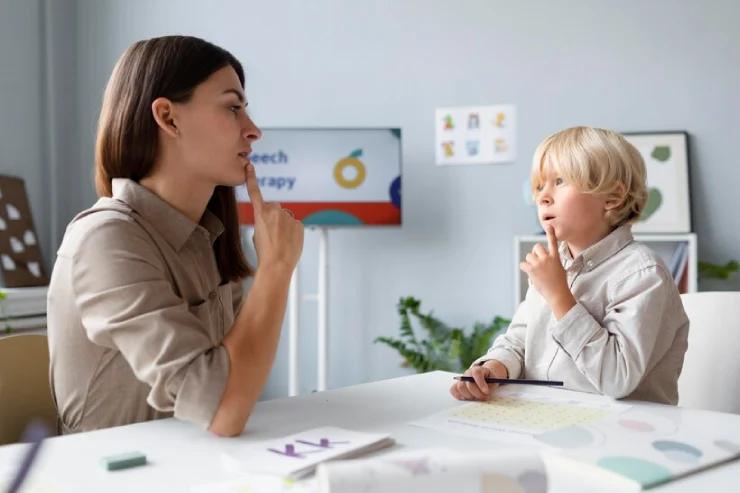
Children need good social skills to make friends, talk to others, and share their thoughts. However, some kids find it difficult to communicate, making socializing difficult. Getting speech therapy for social skills helps children improve their communication, understand emotions, and feel more confident in conversations. It provides structured guidance to enhance social skill development in children, ensuring they learn how to express themselves, recognize social cues, and interact positively in different situations. Speech therapy empowers children to develop meaningful connections and thrive in social environments by addressing communication barriers early.
Understanding Social Skills in Children
Social skills help children interact well with others, including family, friends, and teachers. These skills include:
- Making eye contact and responding appropriately
- Understanding emotions and body language
- Taking turns in conversations
- Asking and answering questions correctly
- Building friendships and working as a team
Most children learn social skills naturally as they grow. However, some may struggle to express their thoughts, recognize social cues, or keep a conversation going. When this happens, they might need extra support.
With the right support, children can improve communication, boost confidence, and better understand social interactions. Social skills therapy for kids provides structured guidance to help them connect more effectively with others. This support allows children to build stronger relationships and feel more comfortable in social situations.
Challenges Faced by Children with Social Skill Deficits
Children with social skill difficulties often struggle in daily interactions, affecting their confidence and relationships. Common challenges include:
- Difficulty Expressing Thoughts: Some children find it difficult to express their ideas, which can cause frustration, anxiety, and social withdrawal.
- Limited Understanding of Social Cues: Reading facial expressions, gestures, and tone of voice can be confusing, leading to miscommunication and misunderstandings.
- Trouble Maintaining Conversations: Keeping a conversation flowing, staying on topic, and responding appropriately can feel overwhelming and frustrating.
- Difficulty in Making Friends: Forming strong connections is harder when communication barriers make social bonding, trust, and interaction difficult.
- Low Confidence in Social Interactions: Communication struggles can lead to self-doubt, insecurity, and hesitation in group activities.
Role of Speech Therapy in Social Skill Development
Speech therapy is important for improving communication challenges and enhancing social skill development in children. Speech therapists assess a child’s strengths and difficulties and design personalized strategies to improve communication and social interactions.
Through targeted exercises, children learn essential social skills such as:
- Initiating and maintaining conversations
- Understanding and using appropriate facial expressions
- Practicing active listening
- Using gestures and body language effectively
- Responding to social situations appropriately
With continuous guidance, children become more confident in communicating and engaging with others in various social settings.
Techniques Used in Speech Therapy to Improve Social Skills
Speech therapists use various methods to help children strengthen their social and communication skills. These include:
- Role-Playing and Social Scripts: Practicing real-life situations helps children learn proper responses, build confidence, and improve social interactions.
- Visual Aids and Social Stories: Storytelling, pictures, and charts help children easily understand emotions, body language, and expected behaviors.
- Turn-Taking Activities: Interactive games teach patience, listening, cooperation, and respectful communication in different social settings.
- Pragmatic Language Therapy: Focuses on using language appropriately in greetings, requests, conversations, problem-solving, and everyday interactions.
- Video Modeling: Watching recorded examples teaches children how to recognize, imitate, and practice proper social behaviors effectively.
- Group Therapy Sessions: Structured peer interactions provide opportunities to practice, refine, and apply social skills in supportive environments.
Benefits of Speech Therapy for Social Skills
The benefits of speech therapy for children extend beyond communication. Speech therapy offers more than just better communication; it equips children with essential life skills, boosting their overall well-being. Key benefits include:
- Improved Communication Abilities: Children learn to express thoughts clearly, listen actively, and understand different speech patterns.
- Stronger Social Relationships: Therapy helps children build meaningful friendships, work well in groups, and interact confidently.
- Increased Confidence and Self-Esteem: Overcoming speech challenges makes children feel more capable, valued, and socially engaged.
- Better Emotional Understanding: Kids develop the ability to identify emotions, read facial expressions, and respond appropriately.
- Enhanced Academic Performance: Clearer communication improves class participation, comprehension, and overall learning success.
Conclusion
Developing social skills is crucial for a child’s overall growth and success. Speech therapy for social skills provides structured techniques to enhance communication, helping children overcome social barriers and build meaningful relationships. With professional guidance, children gain the confidence and skills to thrive in social settings, making interactions more enjoyable and fulfilling.
If your child faces challenges in social interactions, consulting a speech therapist can be a valuable step toward improvement. Early support can significantly help a child connect, communicate, and interact more easily with others.
FAQs
How does speech therapy help develop social skills in children?
Speech therapy enhances social skill development in children by teaching them how to express themselves, interpret social cues, and engage in meaningful interactions. It focuses on improving verbal and non-verbal communication, making it easier for children to build relationships and participate in social activities.
What techniques do speech therapists use to build social skills?
Speech therapists use various techniques, including role-playing, social scripts, video modeling, group therapy, and visual aids. These methods help children practice appropriate social behaviors, improve conversation skills, and develop confidence in social interactions.
What are signs my child may need speech therapy for social skills?
Signs that your child may benefit from social skills therapy for kids include difficulty maintaining conversations, trouble understanding social cues, reluctance to engage with peers, limited eye contact, and struggles with making friends. If these challenges persist, consulting a speech therapist can provide effective solutions.
When should a child start speech therapy for social skills?
Children can start speech therapy for social skills as early as toddlerhood if communication difficulties are evident. However, therapy can be beneficial at any age, depending on the child’s needs. Early intervention leads to better outcomes in social skill development.


